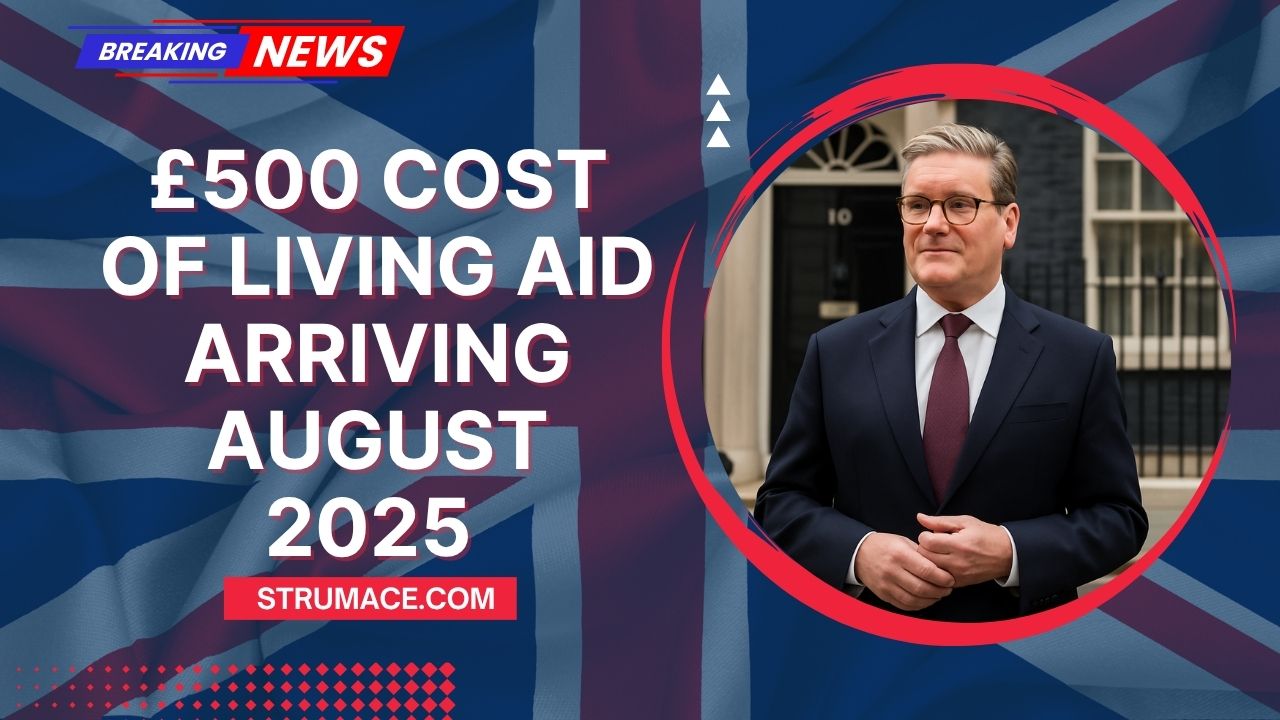As the cost of living continues to rise, UK families facing economic hardship will receive crucial relief in August 2025. The government has officially announced a one-off £500 Cost of Living Support Grant to assist low- and middle-income households.
This measure is part of a broader support framework designed to address the impact of inflation, increasing energy bills, and grocery price surges.
An estimated one million households across the UK are set to benefit from this initiative. Here’s a comprehensive breakdown of the eligibility criteria, payment methods, and what to do if your payment is delayed.
What Is the £500 Cost of Living Support Grant?
The £500 Household Support Grant is a non-repayable payment designed to help families cover rising costs for essentials like housing, food, utilities, and childcare.
This grant follows earlier support schemes worth £299 and £200, and forms part of the government’s larger plan to ease economic stress on vulnerable populations.
The payment will be handled by local councils, in partnership with central government agencies, and distributed through a variety of secure channels.
At a Glance: Key Details of the £500 Grant
| Feature | Details |
|---|---|
| Grant Name | £500 Household Support Grant |
| Payment Period | August 1 to August 31, 2025 |
| Grant Amount | £500 per eligible household |
| Objective | Cover daily essentials during inflationary times |
| Managed By | Local councils & UK Government collaboration |
| Distribution | Bank transfer, prepaid card, postal or digital voucher |
Who Is Eligible for the £500 Grant?
The scheme is targeted at households on low to moderate incomes, especially those who already receive government assistance. However, others facing financial hardship may also apply.
You may be eligible if you fall into one or more of the following categories:
- Universal Credit recipients
- Pensioners claiming Pension Credit
- Families receiving Child Benefit
- Recipients of Housing Benefit
- Individuals receiving disability-related support such as:
- Personal Independence Payment (PIP)
- Disability Living Allowance (DLA)
- Attendance Allowance
Even if you’re not on any of the above benefits but experiencing financial stress, you can apply through your local council, provided they have funds available.
Payment Timeline: When Will You Get the Money?
To avoid bottlenecks and ensure efficient processing, the grant will be paid out in stages throughout August based on the benefit type.
| Date Range | Eligible Group | Payment Method |
|---|---|---|
| Aug 1–7 | Pension Credit & Disability Benefit Claimants | Bank Transfers |
| Aug 8–15 | Universal Credit & Housing Benefit Recipients | Bank or Prepaid Cards |
| Aug 16–31 | Child Benefit Claimants & Others | Postal or Digital Vouchers |
What to Do If You Don’t Receive Your Payment
If your £500 grant hasn’t arrived by the end of August 2025, here are steps to follow:
- Check your benefit account (such as Universal Credit or Pension Credit) using your National Insurance Number.
- Contact your local council to verify your eligibility and payment status.
- Reach out to the Department for Work and Pensions (DWP) or visit the official GOV.UK website to report a missing or delayed payment.
Also, make sure your bank account details and address are accurate and up to date to avoid any issues with the payment.
The £500 Cost of Living Support Grant set for August 2025 represents a timely and vital intervention by the government to support millions facing economic pressure.
With inflation affecting essential costs like food and energy, this non-repayable payment offers real relief to those who need it most. If you think you’re eligible, it’s important to stay updated, confirm your details, and reach out early if any issues arise.
FAQs
Can I apply for the £500 grant if I’m not currently on any benefits?
Yes, if you’re experiencing financial hardship, you may still be eligible. Contact your local council to check if discretionary funds are available.
Is this grant taxable or do I need to repay it?
No, the £500 grant is tax-free and does not need to be repaid. It is designed as direct support.
What if I move to a different local council before August?
You should update your residency information as soon as possible with your local authority to avoid delays or confusion in receiving your payment.




